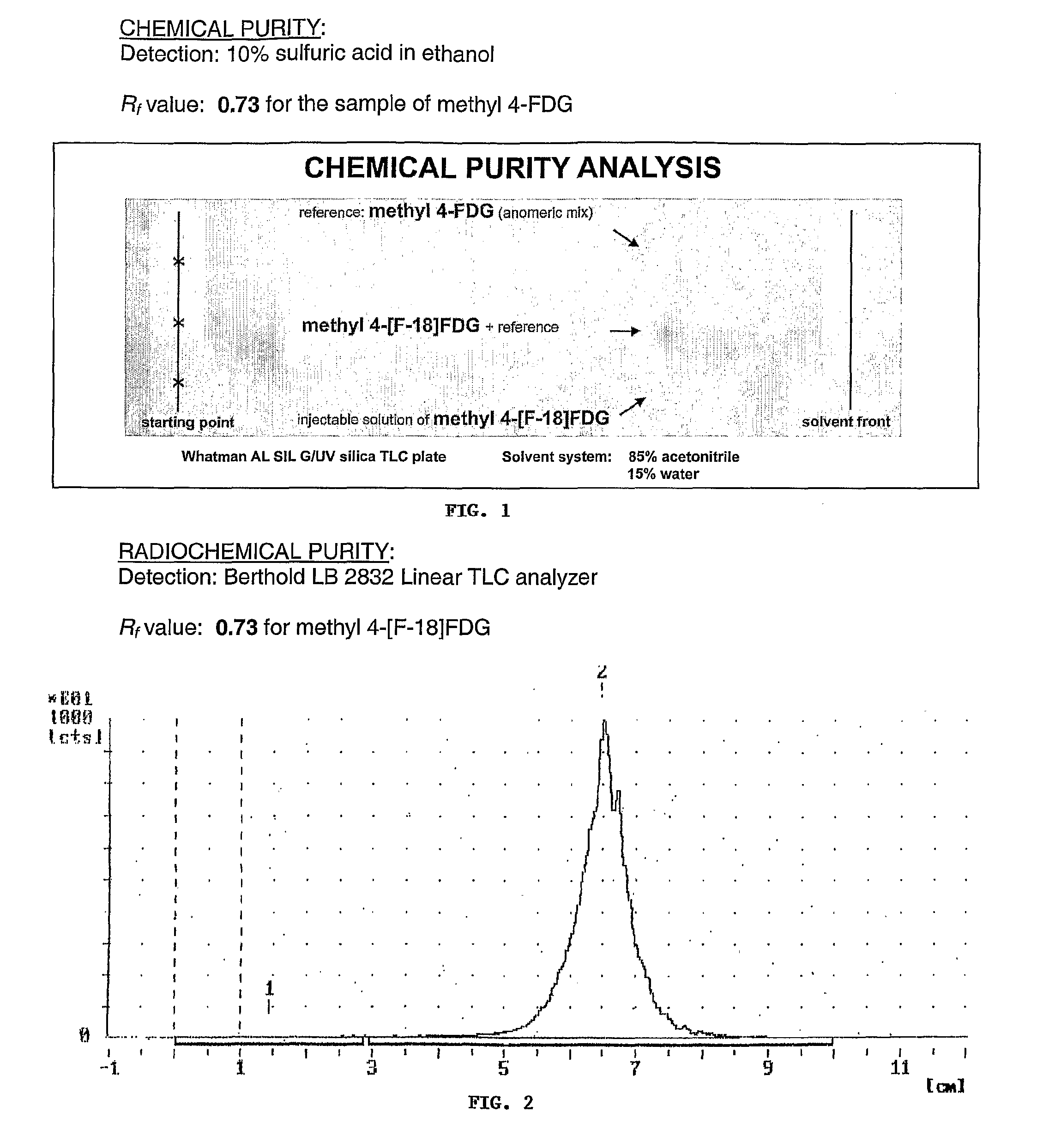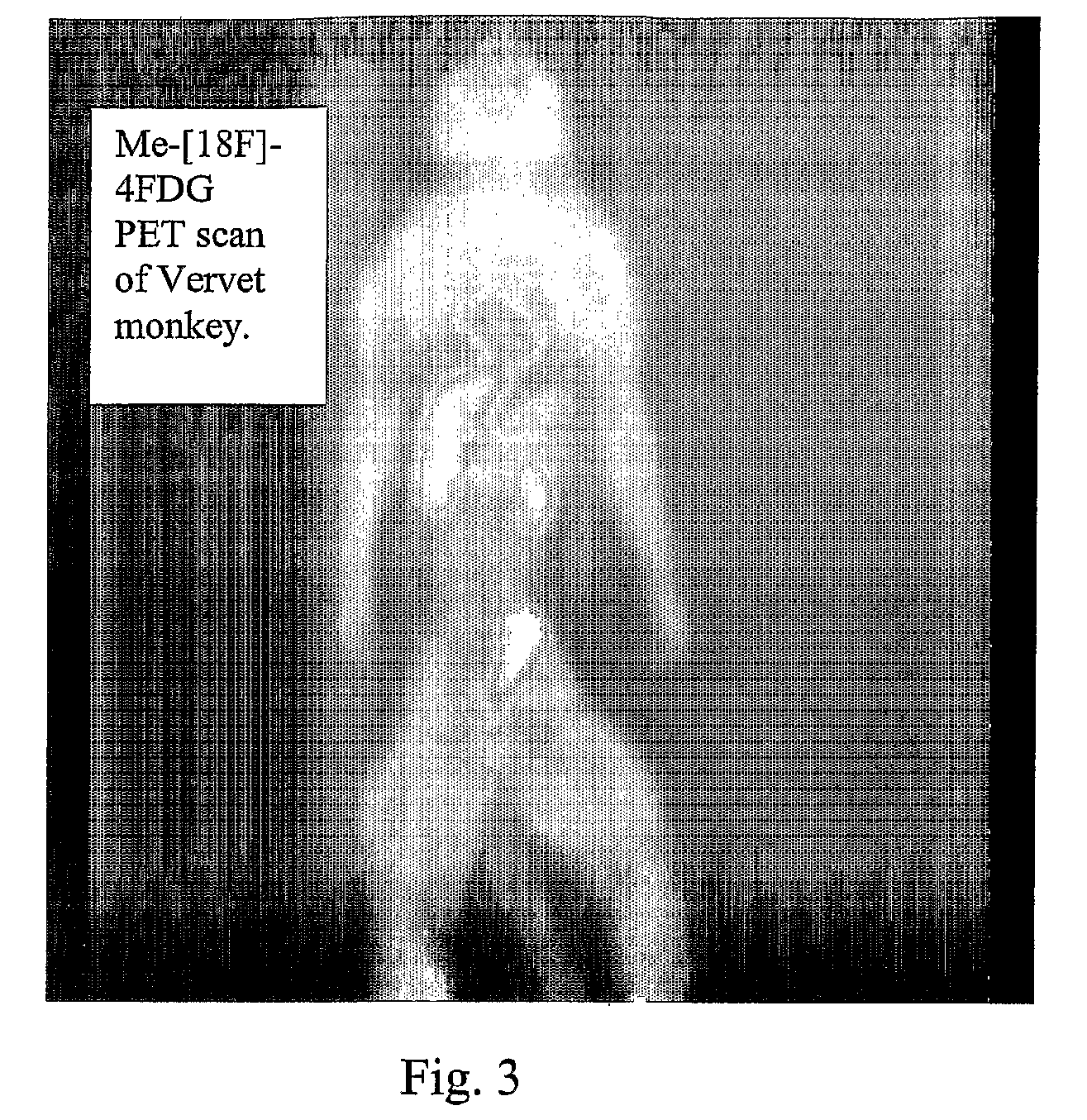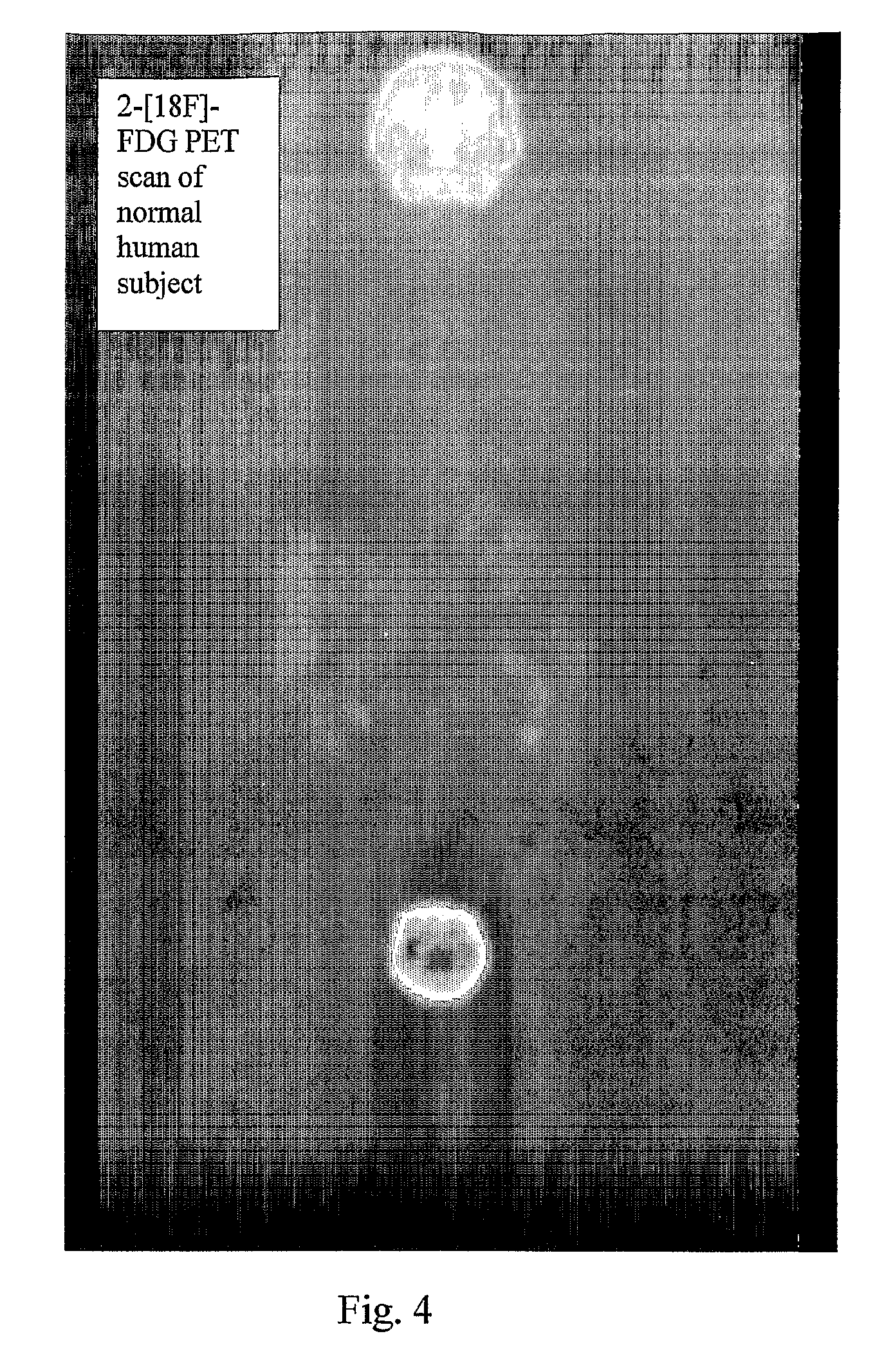Tracers for monitoring the activity of sodium/glucose cotransporters in health and disease
a sodium/glucose cotransporter and glucose metabolism technology, applied in the field of radiolabeled tracers and methods for monitoring the activity of sodium/glucose cotransporters, can solve the problems of loss of consciousness and even death, poor substrate for 2-fdg glucose transporters, and genetic defects in glucose transport across the blood brain. , to achieve the effect of better assessing the usefulness (and/or the deleterious effect) of the agent on the mammal
- Summary
- Abstract
- Description
- Claims
- Application Information
AI Technical Summary
Benefits of technology
Problems solved by technology
Method used
Image
Examples
example 1
Methyl-4-deoxy-4-[18F]fluoro-alpha-D-glucopyranoside
[0065]Methyl 2,3,6-tri-O-acetyl-4-O-trifyl-alpha-D-galactopyranoside and methyl 2,3,6-tri-O-acetyl-4-O-trifyl-beta-D-galactopyranoside were prepared following the procedures described in the literature. (Kiefel M J; Beisner B; Bennett S; Holmes I D; von Itzstein M: Synthesis and biological evaluation of N-acetylneuraminic acid-based rotavirus inhibitors. Journal of Medicinal Chemistry 1996, 39, 1314-1320.)
[0066][18F]Fluoride was prepared by proton bombardment of [18O] enriched water via [18O](p,n)[18F] nuclear reaction. At the end of the bombardment, activity was transferred into a solution of 1 mg of potassium carbonate and 10 mg of Kryptofix 2.2.2 in 40 μL of water and 960 μL of acetonitrile. The volatile components were evaporated under a stream of nitrogen at 110° C. and the residual moisture was co-evaporated with acetonitrile (3×0.5 mL).
[0067]Methyl 2,3,6-tri-O-acetyl-4-O-trifyl-beta-D-galactopyranoside (5 mg) dissolved in 1 ...
example 2
Radiosynthesis of O-[11C]-Methyl-4-FDG
[0074]This procedure is a modification of the one described by Bormans et al., J. Nucl. Med 44:1075-1081 (2003) for 11C-methyl glucose. [11C]—CH3I was synthesized from [11]CO2 using standard procedures well established in the literature. [11C]-methyl triflate was obtained by passage of [11C]-CH3I over a Ag-triflate column at 180° C. [11C]-methyl triflate was bubbled through a solution of 3 mg of 4-FDG (prepared as described above) in a mixture of 0.5 mL of 0.05 mol / L NaOH and 1 mL of acetone for 5 min at room temperature. The solution was then neutralized with phosphate buffer, pH 6 (0.5 mol / L), and acetone was evaporated by careful heating under a stream of helium. The resulting solution was diluted with saline to an appropriate radioactive concentration for in vivo studies. For biodistribution of the individual alpha and beta-anomers, the anomeric mixture was separated using high-performance liquid chromatography (HPLC) with an Aminex HPX-87c ...
example 3
Use of a Tracer as an In Vitro Marker of SGLTs
[0075]Procedures aimed at detecting radioactivity (e.g. autoradiography) are used to map distribution and function (e.g. pharmacological blockade) of SGLTs in individual cells, cell lines, tissue specimens, etc. Isolated tissue specimens, cells, or cell lines are incubated in media under physiological conditions of pH, temperature, and oxygenation. A radiolabeled tracer as described above is added and, at various time intervals, aliquots of the tissue / cells are removed and washed free of the tracer with ice-cold buffers. The radioactivity in the whole tissue or cell sample is assayed using a counter (e.g., a gamma or liquid scintillation counter), and the uptake (moles) at each time point is calculated (corrected for time decay and normalized for the quantity of tissue / cells used). The tracer uptake is optionally measured in the presence and absence of one or more competitive agents for SGLTs, e.g., sodium, phlorizin, glucose, galactose,...
PUM
| Property | Measurement | Unit |
|---|---|---|
| half life | aaaaa | aaaaa |
| temperature | aaaaa | aaaaa |
| temperature | aaaaa | aaaaa |
Abstract
Description
Claims
Application Information
 Login to View More
Login to View More - R&D
- Intellectual Property
- Life Sciences
- Materials
- Tech Scout
- Unparalleled Data Quality
- Higher Quality Content
- 60% Fewer Hallucinations
Browse by: Latest US Patents, China's latest patents, Technical Efficacy Thesaurus, Application Domain, Technology Topic, Popular Technical Reports.
© 2025 PatSnap. All rights reserved.Legal|Privacy policy|Modern Slavery Act Transparency Statement|Sitemap|About US| Contact US: help@patsnap.com



